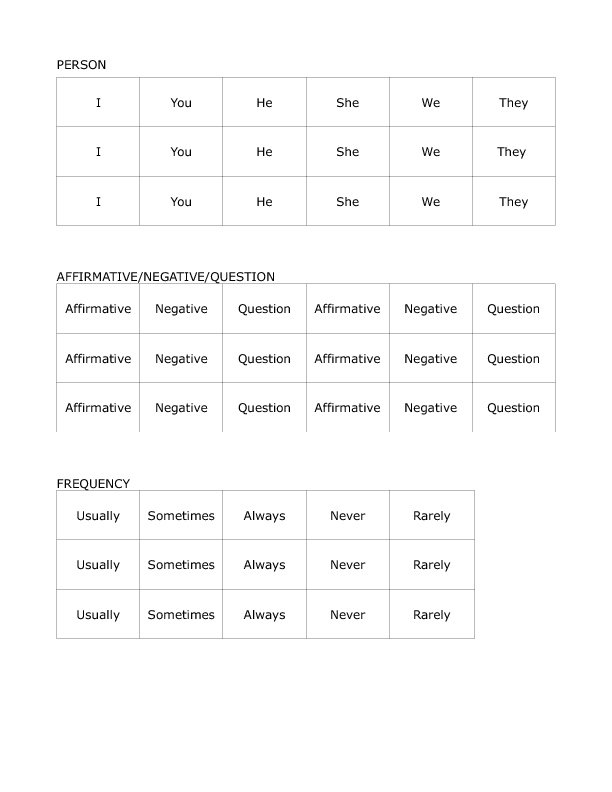The objective of this worksheet is for beginning ESL students to construct sentences in the present simple in a fun way – turning it into a game. It requires a certain amount of time and preparation on the teacher's behalf, but once printed and cut out (I also recommend plasticizing them, for durability's sake), they can be used in a multitude of different combinations, and prove a good teacher's resource that can be used over and over again.
The game is organized in a series of cards, belonging to different categories, which are to be cut out and set in different piles, corresponding to:
* Person
* Affirmative/Negative/Question
* Frequency
* Verbs
* Time of the day
* Day of the week
It is recommendable, for the teacher's sake, to either write the name of the category on the back of the cards (sorry that option isn't provided in the worksheet) or find another way to organize them that is suitable/practical for you.
The first student must chose a card from each pile (in the order they are supplied in...or not. You choose depending on whether you want to make it easier or harder) and build a sentence with:
the person + affirmative/negative/question + frequency + verb + time of the day + day of the week
Therefore, if his cards are: I + affirmative + never + get up + at 9 in the morning + on Wednesdays
the student must say: "I never get up at nine in the morning on Wednesdays."
Or, if his/her cards are: She + question + usually + brush teeth + at 2 in the morning + on Thursday?
The student must say: "Does she usually brush her teeth at 2 in the morning on Thurdays?"
Then the next student proceeds to do the same, building a sentence based on the cards he/she has chosen, until all students have built a (or several) sentence(s). The (relative) unpredictability in the sentences that are created adds a fun element to the class, especially when they are odd/funny ones, e.g.:
"We always clean the house at midnight on Tuesdays"
or
"Do you usually go swimming at four in the morning on Sundays?"
The flexibility of this game reside in the teacher's choice of which card categories he/she includes for his/her students, which cards he/she includes in each category, and whether he/she presents them in the right order, thus being able to adjust the difficulty according to the students' level/rythm.
If, for instance, the teacher has just begun teaching the present simple, and the students aren't familiar with many verbs in English, he/she can limit the amount of verbs included. Or reduce the verbal persons, beginning only with “I” and “You”. Or only include cards for affirmative sentences. Or only use frequency instead of affirmative/negative/question. There are many possibilities, and if used wisely, this game can be a fun part of several consecutive lessons, increasing in difficulty alongside the students' progress.
The game is organized in a series of cards, belonging to different categories, which are to be cut out and set in different piles, corresponding to:
* Person
* Affirmative/Negative/Question
* Frequency
* Verbs
* Time of the day
* Day of the week
It is recommendable, for the teacher's sake, to either write the name of the category on the back of the cards (sorry that option isn't provided in the worksheet) or find another way to organize them that is suitable/practical for you.
The first student must chose a card from each pile (in the order they are supplied in...or not. You choose depending on whether you want to make it easier or harder) and build a sentence with:
the person + affirmative/negative/question + frequency + verb + time of the day + day of the week
Therefore, if his cards are: I + affirmative + never + get up + at 9 in the morning + on Wednesdays
the student must say: "I never get up at nine in the morning on Wednesdays."
Or, if his/her cards are: She + question + usually + brush teeth + at 2 in the morning + on Thursday?
The student must say: "Does she usually brush her teeth at 2 in the morning on Thurdays?"
Then the next student proceeds to do the same, building a sentence based on the cards he/she has chosen, until all students have built a (or several) sentence(s). The (relative) unpredictability in the sentences that are created adds a fun element to the class, especially when they are odd/funny ones, e.g.:
"We always clean the house at midnight on Tuesdays"
or
"Do you usually go swimming at four in the morning on Sundays?"
The flexibility of this game reside in the teacher's choice of which card categories he/she includes for his/her students, which cards he/she includes in each category, and whether he/she presents them in the right order, thus being able to adjust the difficulty according to the students' level/rythm.
If, for instance, the teacher has just begun teaching the present simple, and the students aren't familiar with many verbs in English, he/she can limit the amount of verbs included. Or reduce the verbal persons, beginning only with “I” and “You”. Or only include cards for affirmative sentences. Or only use frequency instead of affirmative/negative/question. There are many possibilities, and if used wisely, this game can be a fun part of several consecutive lessons, increasing in difficulty alongside the students' progress.
